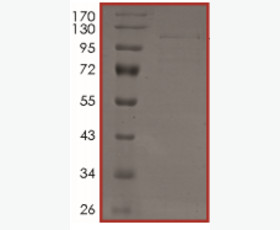Recombinant Human Tumor Necrosis Factor α/TNFα
| Product name: | Recombinant Human Tumor Necrosis Factor α/TNFα |
| Source: | E.coli |
| Purity: | Greater than 95% as determined by reducing SDS-PAGE. |
| Buffer Formulation: | Lyophilized from a 0.2 μm filtered solution of 20mM PB, 150mM NaCl, pH 7.0. |
| Applications: | Applications:SDS-PAGE; WB; ELISA; IP. |
| Storage: | Avoid repeated freeze/thaw cycles. Store at 2-8 oC for one month. Aliquot and store at -80 oC for 12 months. |
| UOM: | 100ug/50ug/200ug/1mg/1g |
| Source | E.coli |
| Description | Recombinant Human Tumor Necrosis Factor alpha is produced by our E.coli expression system and the target gene encoding Val77-Leu233 is expressed. |
| Names | Tumor Necrosis Factor, Cachectin, TNF-Alpha, Tumor Necrosis Factor Ligand Superfamily Member 2, TNF-a, TNF, TNFA, TNFSF2 |
| Accession # | P01375 |
| Formulation | Lyophilized from a 0.2 μm filtered solution of 20mM PB, 150mM NaCl, pH 7.0. |
| Shipping |
The product is shipped at ambient temperature. |
| Reconstitution |
Always centrifuge tubes before opening. Do not mix by vortex or pipetting. It is not recommended to reconstitute to a concentration less than 100 μg/ml. Dissolve the lyophilized protein in ddH2O. Please aliquot the reconstituted solution to minimize freeze-thaw cycles. |
| Storage |
Lyophilized protein should be stored at < -20°C, though stable at room temperature for 3 weeks. Reconstituted protein solution can be stored at 4-7°C for 2-7 days. Aliquots of reconstituted samples are stable at < -20°C for 3 months. |
| Biological Activity |
ED50 is less than 0.03 ng/ml. Specific Activity of 3.0 x 10^7 IU/mg. |
| Purity |
Greater than 95% as determined by reducing SDS-PAGE. |
| Endotoxin | Less than 0.1 ng/µg (1 IEU/µg) as determined by LAL test. |
| Amino Acid Sequence |
MVRSSSRTPSDKPVAHVVANPQAEGQLQWLNRRANALLANGVELRDNQLVVPSEGLYLIYSQVLF KGQGCPSTHVLLTHTISRIAVSYQTKVNLLSAIKSPCQRETPEGAEAKPWYEPIYLGGVFQLEKG DRLSAEINRPDYLDFAESGQVYFGIIAL
|
| Background | TNFα is a homotrimer with a subunit molecular mass of 17 kD and plays a major role in growth regulation, differentiation, inflammation, viral replication, tumorigenesis, autoimmune diseases and in viral, bacterial, fungal, and parasitic infections. Besides inducing hemorrhagic necrosis of tumors, TNF was found to be involved in tumorigenesis, tumor metastasis, viral replication, septic shock, fever, inflammation, and autoimmune diseases including Crohn’s disease, and rheumatoid arthritis as well as graft-versus-host disease. |
| References |
Wu Y,et al.DDIT3 overexpression increases odontoblastic potential of human dental pulp cells PMID:24738922 http://www.ncbi.nlm.nih.gov/pubmed/24738922 |














